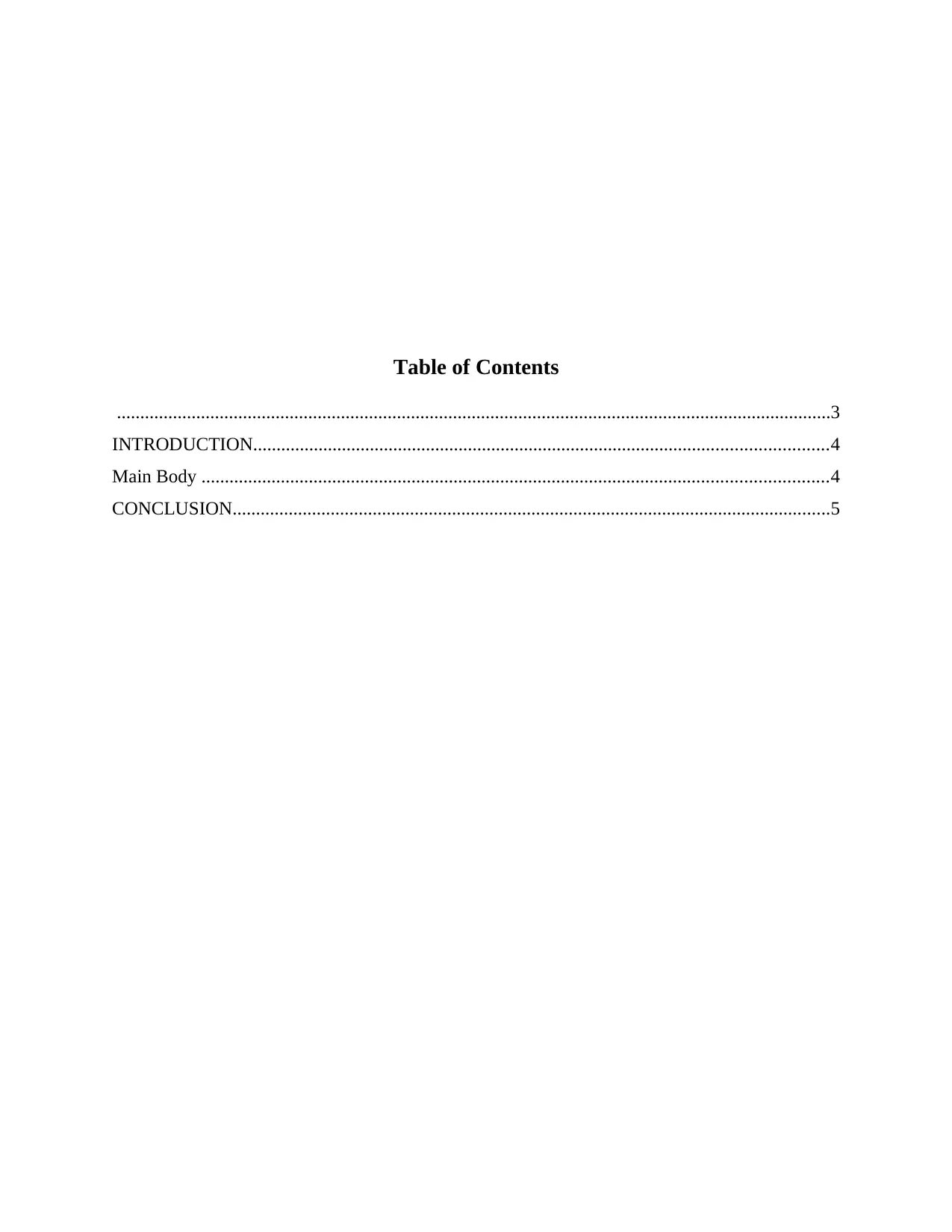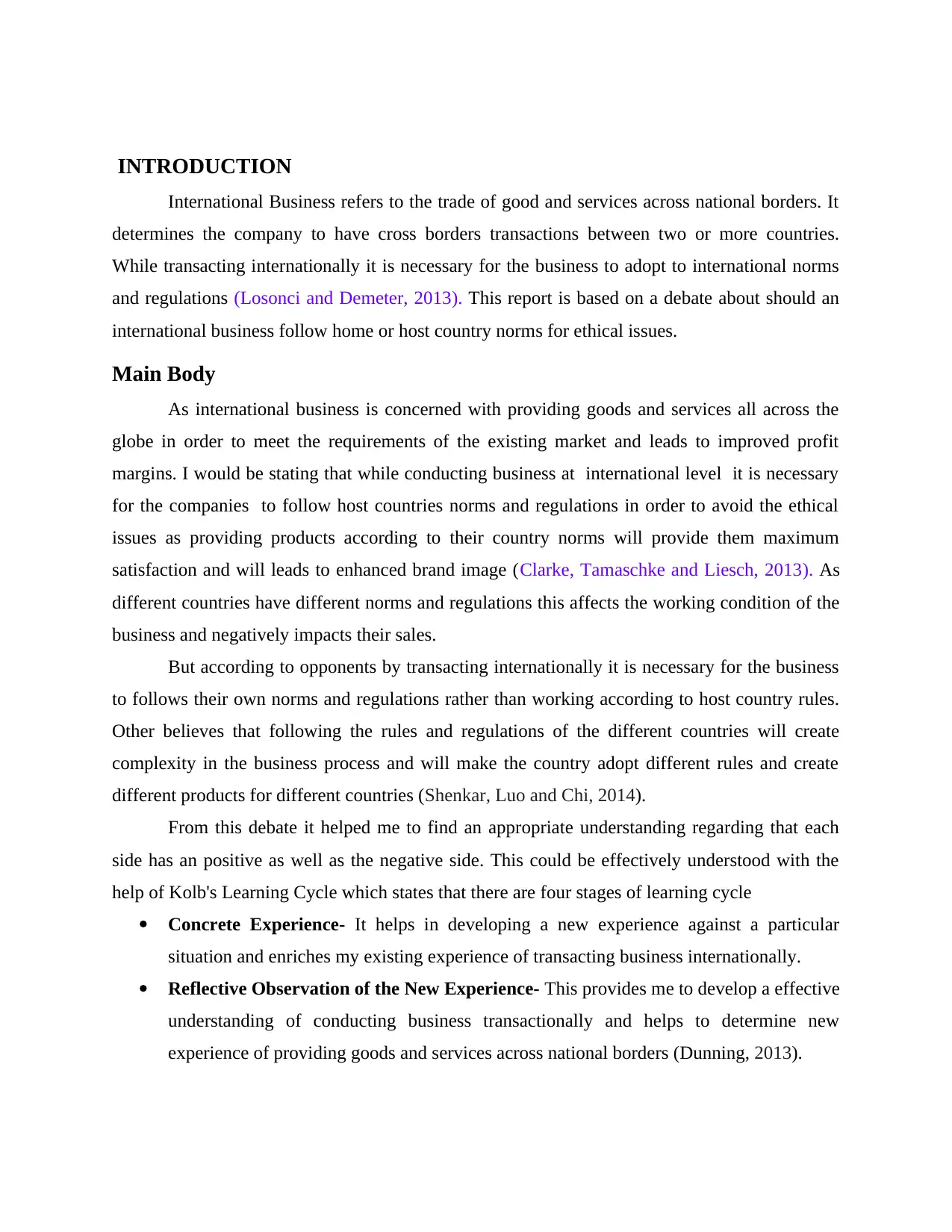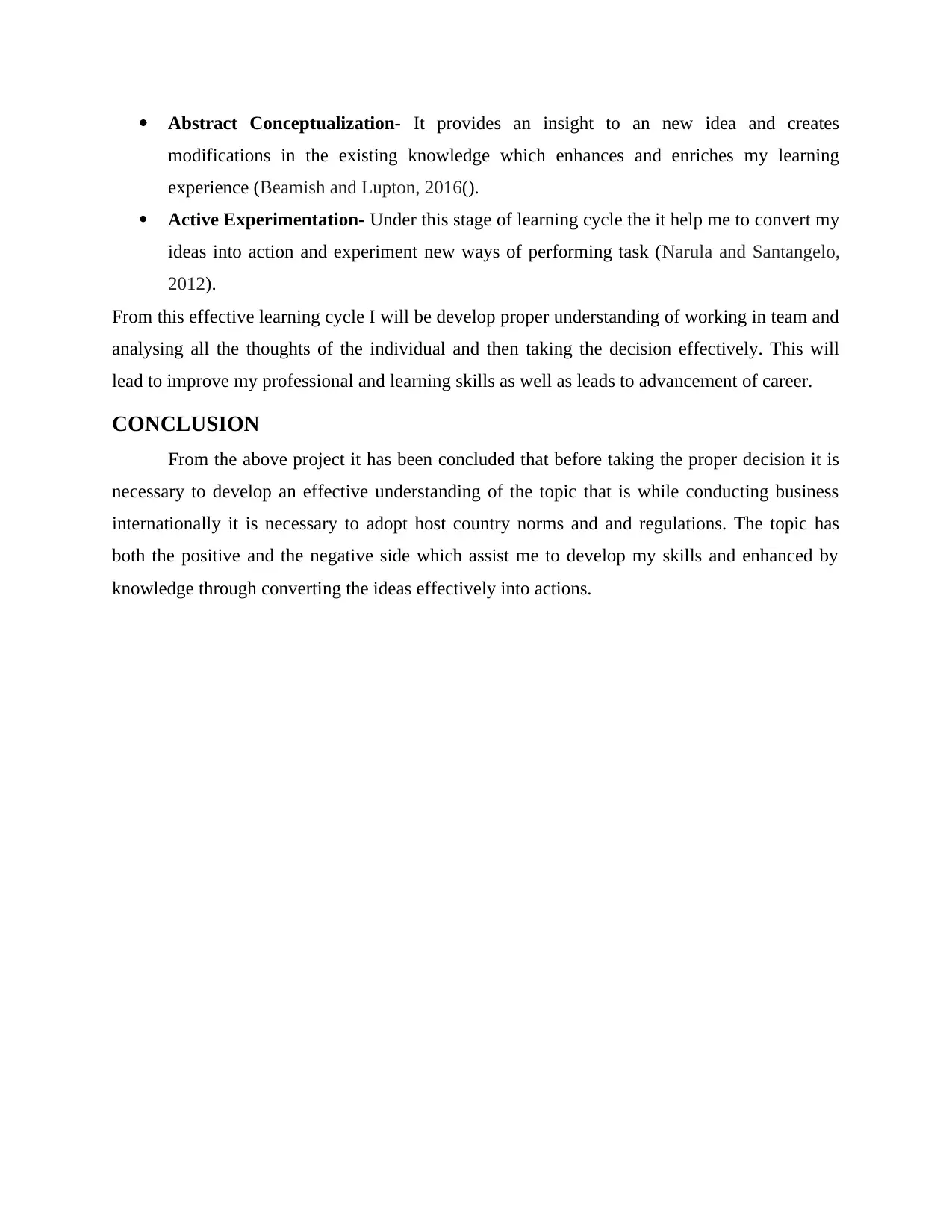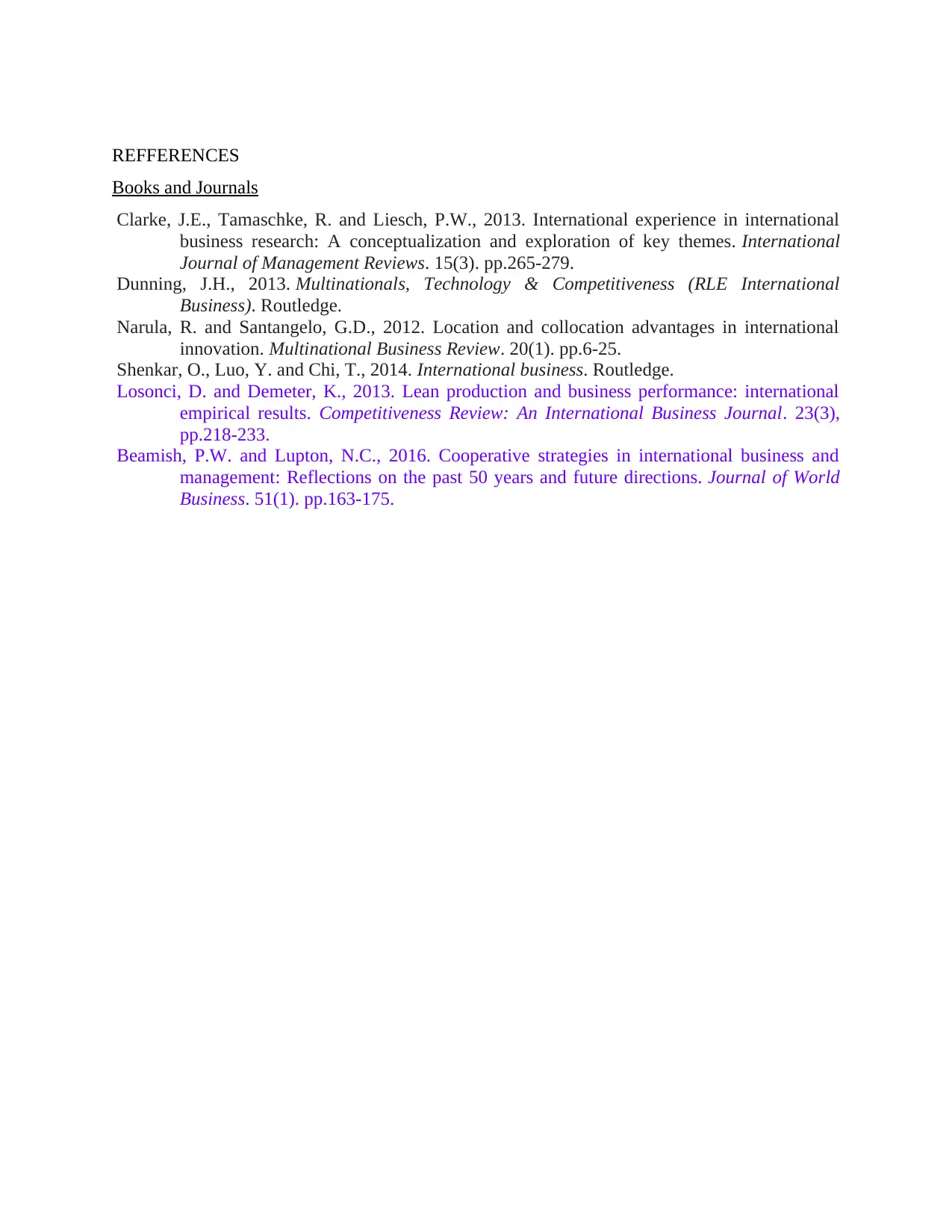International Business: Reflection on Ethical Norms Debate Analysis
VerifiedAdded on 2021/01/02
|5
|764
|423
Report
AI Summary
This report reflects on a debate concerning ethical norms in international business, specifically addressing whether businesses should adhere to home or host country regulations. The author argues in favor of following host country norms to avoid ethical issues and enhance brand image, acknowledging the differing regulations across countries. The report examines the debate from multiple perspectives, including the counter-argument that following different rules creates complexity. The analysis incorporates Kolb's Learning Cycle to understand the learning process, including concrete experience, reflective observation, abstract conceptualization, and active experimentation, with the aim of improving professional and learning skills. The conclusion emphasizes the importance of understanding both sides of the issue before making decisions in international business.

Reflection on a debate
Paraphrase This Document
Need a fresh take? Get an instant paraphrase of this document with our AI Paraphraser

Table of Contents
.........................................................................................................................................................3
INTRODUCTION...........................................................................................................................4
Main Body ......................................................................................................................................4
CONCLUSION................................................................................................................................5
.........................................................................................................................................................3
INTRODUCTION...........................................................................................................................4
Main Body ......................................................................................................................................4
CONCLUSION................................................................................................................................5

INTRODUCTION
International Business refers to the trade of good and services across national borders. It
determines the company to have cross borders transactions between two or more countries.
While transacting internationally it is necessary for the business to adopt to international norms
and regulations (Losonci and Demeter, 2013). This report is based on a debate about should an
international business follow home or host country norms for ethical issues.
Main Body
As international business is concerned with providing goods and services all across the
globe in order to meet the requirements of the existing market and leads to improved profit
margins. I would be stating that while conducting business at international level it is necessary
for the companies to follow host countries norms and regulations in order to avoid the ethical
issues as providing products according to their country norms will provide them maximum
satisfaction and will leads to enhanced brand image (Clarke, Tamaschke and Liesch, 2013). As
different countries have different norms and regulations this affects the working condition of the
business and negatively impacts their sales.
But according to opponents by transacting internationally it is necessary for the business
to follows their own norms and regulations rather than working according to host country rules.
Other believes that following the rules and regulations of the different countries will create
complexity in the business process and will make the country adopt different rules and create
different products for different countries (Shenkar, Luo and Chi, 2014).
From this debate it helped me to find an appropriate understanding regarding that each
side has an positive as well as the negative side. This could be effectively understood with the
help of Kolb's Learning Cycle which states that there are four stages of learning cycle
Concrete Experience- It helps in developing a new experience against a particular
situation and enriches my existing experience of transacting business internationally.
Reflective Observation of the New Experience- This provides me to develop a effective
understanding of conducting business transactionally and helps to determine new
experience of providing goods and services across national borders (Dunning, 2013).
International Business refers to the trade of good and services across national borders. It
determines the company to have cross borders transactions between two or more countries.
While transacting internationally it is necessary for the business to adopt to international norms
and regulations (Losonci and Demeter, 2013). This report is based on a debate about should an
international business follow home or host country norms for ethical issues.
Main Body
As international business is concerned with providing goods and services all across the
globe in order to meet the requirements of the existing market and leads to improved profit
margins. I would be stating that while conducting business at international level it is necessary
for the companies to follow host countries norms and regulations in order to avoid the ethical
issues as providing products according to their country norms will provide them maximum
satisfaction and will leads to enhanced brand image (Clarke, Tamaschke and Liesch, 2013). As
different countries have different norms and regulations this affects the working condition of the
business and negatively impacts their sales.
But according to opponents by transacting internationally it is necessary for the business
to follows their own norms and regulations rather than working according to host country rules.
Other believes that following the rules and regulations of the different countries will create
complexity in the business process and will make the country adopt different rules and create
different products for different countries (Shenkar, Luo and Chi, 2014).
From this debate it helped me to find an appropriate understanding regarding that each
side has an positive as well as the negative side. This could be effectively understood with the
help of Kolb's Learning Cycle which states that there are four stages of learning cycle
Concrete Experience- It helps in developing a new experience against a particular
situation and enriches my existing experience of transacting business internationally.
Reflective Observation of the New Experience- This provides me to develop a effective
understanding of conducting business transactionally and helps to determine new
experience of providing goods and services across national borders (Dunning, 2013).
⊘ This is a preview!⊘
Do you want full access?
Subscribe today to unlock all pages.

Trusted by 1+ million students worldwide

Abstract Conceptualization- It provides an insight to an new idea and creates
modifications in the existing knowledge which enhances and enriches my learning
experience (Beamish and Lupton, 2016().
Active Experimentation- Under this stage of learning cycle the it help me to convert my
ideas into action and experiment new ways of performing task (Narula and Santangelo,
2012).
From this effective learning cycle I will be develop proper understanding of working in team and
analysing all the thoughts of the individual and then taking the decision effectively. This will
lead to improve my professional and learning skills as well as leads to advancement of career.
CONCLUSION
From the above project it has been concluded that before taking the proper decision it is
necessary to develop an effective understanding of the topic that is while conducting business
internationally it is necessary to adopt host country norms and and regulations. The topic has
both the positive and the negative side which assist me to develop my skills and enhanced by
knowledge through converting the ideas effectively into actions.
modifications in the existing knowledge which enhances and enriches my learning
experience (Beamish and Lupton, 2016().
Active Experimentation- Under this stage of learning cycle the it help me to convert my
ideas into action and experiment new ways of performing task (Narula and Santangelo,
2012).
From this effective learning cycle I will be develop proper understanding of working in team and
analysing all the thoughts of the individual and then taking the decision effectively. This will
lead to improve my professional and learning skills as well as leads to advancement of career.
CONCLUSION
From the above project it has been concluded that before taking the proper decision it is
necessary to develop an effective understanding of the topic that is while conducting business
internationally it is necessary to adopt host country norms and and regulations. The topic has
both the positive and the negative side which assist me to develop my skills and enhanced by
knowledge through converting the ideas effectively into actions.
Paraphrase This Document
Need a fresh take? Get an instant paraphrase of this document with our AI Paraphraser

REFFERENCES
Books and Journals
Clarke, J.E., Tamaschke, R. and Liesch, P.W., 2013. International experience in international
business research: A conceptualization and exploration of key themes. International
Journal of Management Reviews. 15(3). pp.265-279.
Dunning, J.H., 2013. Multinationals, Technology & Competitiveness (RLE International
Business). Routledge.
Narula, R. and Santangelo, G.D., 2012. Location and collocation advantages in international
innovation. Multinational Business Review. 20(1). pp.6-25.
Shenkar, O., Luo, Y. and Chi, T., 2014. International business. Routledge.
Losonci, D. and Demeter, K., 2013. Lean production and business performance: international
empirical results. Competitiveness Review: An International Business Journal. 23(3),
pp.218-233.
Beamish, P.W. and Lupton, N.C., 2016. Cooperative strategies in international business and
management: Reflections on the past 50 years and future directions. Journal of World
Business. 51(1). pp.163-175.
Books and Journals
Clarke, J.E., Tamaschke, R. and Liesch, P.W., 2013. International experience in international
business research: A conceptualization and exploration of key themes. International
Journal of Management Reviews. 15(3). pp.265-279.
Dunning, J.H., 2013. Multinationals, Technology & Competitiveness (RLE International
Business). Routledge.
Narula, R. and Santangelo, G.D., 2012. Location and collocation advantages in international
innovation. Multinational Business Review. 20(1). pp.6-25.
Shenkar, O., Luo, Y. and Chi, T., 2014. International business. Routledge.
Losonci, D. and Demeter, K., 2013. Lean production and business performance: international
empirical results. Competitiveness Review: An International Business Journal. 23(3),
pp.218-233.
Beamish, P.W. and Lupton, N.C., 2016. Cooperative strategies in international business and
management: Reflections on the past 50 years and future directions. Journal of World
Business. 51(1). pp.163-175.
1 out of 5
Related Documents
Your All-in-One AI-Powered Toolkit for Academic Success.
+13062052269
info@desklib.com
Available 24*7 on WhatsApp / Email
![[object Object]](/_next/static/media/star-bottom.7253800d.svg)
Unlock your academic potential
Copyright © 2020–2026 A2Z Services. All Rights Reserved. Developed and managed by ZUCOL.



